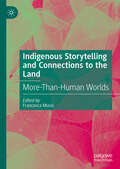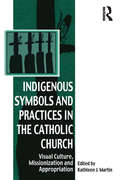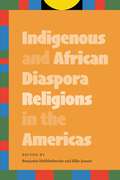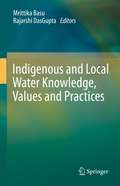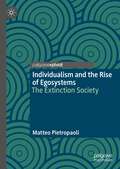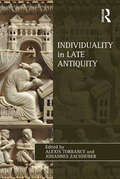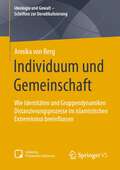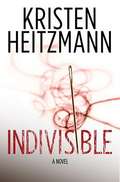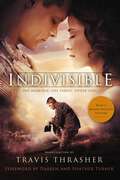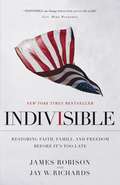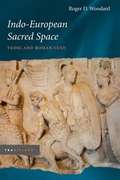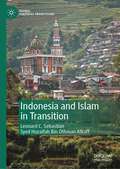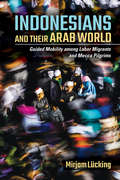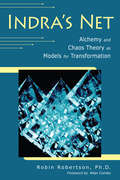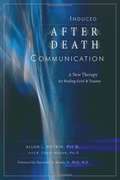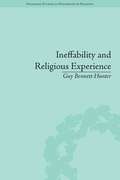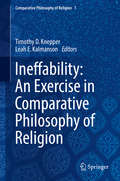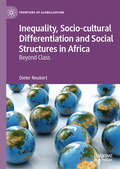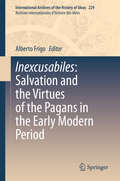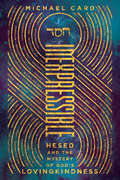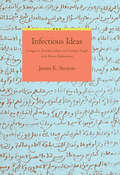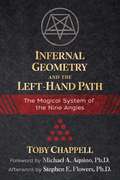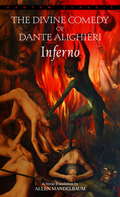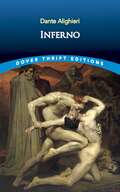- Table View
- List View
Indigenous Storytelling and Connections to the Land: More-Than-Human Worlds
by Francesca MussiThis book builds on the perspective that, for Indigenous peoples, relations to the land are familial, intimate, intergenerational, spiritual, instructive, and life nourishing, and it is these relations that Western societies sought to destroy as part of their colonial projects of territorial conquest and exploitation of resources. Positioning storytelling as a research methodology and a model of decolonial practice, this edited collection seeks to explore the following key questions: how does Indigenous storytelling contribute to understanding Indigenous identity and the crucial role of the land in Indigenous ways of life? How can Indigenous storytelling subvert colonial narratives of the land? How can Indigenous storytelling contribute to addressing colonial exploitations of the land and its resources? Can Indigenous storytelling become a rich mode for the investigation of current climate crises? And, finally, how does storytelling assist Indigenous peoples in restoring their intimate relations to the land and its natural gifts? Through critical analysis of a unique range of Indigenous storytelling practices, including fiction, performative art, new media platforms, archaeological findings and personal live-experienced stories, this collection aims to examine the interplay between colonialism and current environmental challenges, and to expose the impacts – past, present, and future – of Western worldviews on Indigenous connections to the land, whilst simultaneously bringing to the fore Indigenous ethos of care and land custodianship.
Indigenous Symbols and Practices in the Catholic Church: Visual Culture, Missionization and Appropriation (Vitality of Indigenous Religions)
by Kathleen J. MartinIndigenous Symbols and Practices in the Catholic Church presents views, concepts and perspectives on the relationships among Indigenous Peoples and the Catholic Church, as well as stories, images and art as metaphors for survival in a contemporary world. Few studies present such interdisciplinary interpretations from contributors in multiple disciplines regarding appropriation, spiritual and religious tradition, educational issues in the teaching of art and art history, the effects of government sanctions on traditional practice, or the artistic interpretation of symbols from Indigenous perspectives. Through photographs and visual materials, interviews and data analysis, personal narratives and stories, these chapters explore the experiences of Indigenous Peoples whose lives have been impacted by multiple forces - Christian missionaries, governmental policies, immigration and colonization, education, assimilation and acculturation. Contributors investigate current contexts and complex areas of conflict regarding missionization, appropriation and colonizing practices through asking questions such as, 'What does the use of images mean for resistance, transformation and cultural destruction?' And, 'What new interpretations and perspectives are necessary for Indigenous traditions to survive and flourish in the future?'
Indigenous and African Diaspora Religions in the Americas
by Silke Jansen Benjamin HebblethwaiteIndigenous and African Diaspora Religions in the Americas explores spirit-based religious traditions across vast geographical and cultural expanses, including Canada, the United States, Haiti, the Dominican Republic, Cuba, Trinidad and Tobago, Mexico, Brazil, and Chile. Using interdisciplinary research methods, this collection of original perspectives breaks new ground by examining these traditions as typologically and historically related. This curated selection of the traditions allows readers to compare and highlight convergences, while the description and comparison of the traditions challenges colonial erasures and expands knowledge about endangered cultures. The inclusion of spirit-based traditions from a broad geographical area emphasizes the typology of religion over ethnic compartmentalization. The individuals and communities studied in this collection serve spirits through rituals, song, instruments, initiation, embodiment via possession or trance, veneration of nature, and, among some Indigenous people, the consumption of ritual psychoactive entheogens. Indigenous and African diaspora practices focused on service to ancestors and spirits reflect ancient substrates of religiosity. The rationale to separate them on disciplinary, ethnic, linguistic, geographical, or historical grounds evaporates in our interconnected world. Shared cultural, historical, and structural features of American indigenous and African diaspora spirit-based traditions mutually deserve our attention since the analyses and dialogues give way to discoveries about deep commonalities and divergences among religions and philosophies. Still struggling against the effects of colonialism, enslavement, and extinction, the practitioners of these spirit-based religious traditions hold on to important but vulnerable parts of humanity&’s cultural heritage. These readings make possible journeys of recognition as well as discovery.
Indigenous and Local Water Knowledge, Values and Practices
by Rajarshi DasGupta Mrittika BasuThis book provides a knowledge base of the existing indigenous and local water knowledge, values, and practices, and how this water knowledge can be mainstreamed into the decision-making process. The book not only demonstrates the perks of using indigenous knowledge but also illustrates the barriers and gaps that should be considered while planning for mainstreaming traditional knowledge and values at a local scale. The chapters incorporate case studies from various parts of the world demonstrating how indigenous, and religious and cultural values of water have translated into water use and conservation behavior among indigenous people ensuring resource sustainability over a long period of time. There has been global attention towards combining indigenous and local knowledge with new information and innovation to attain future water security. In this regard, this book is timely, relevant, and significant as it is the first attempt, as per the best of our knowledge, to publish a book that solely addresses indigenous and local knowledge, values, and practices regarding water management, quality monitoring, use, and conservation. With increasing emphasis on the inclusion of indigenous and local knowledge into natural resource governance and conservation by international agencies like the Intergovernmental Science-Policy Platform on Biodiversity and Ecosystem Services (IPBES), the proposed book will significantly contribute to the existing knowledge base and demonstrate the importance of mainstreaming indigenous water knowledge and practices into water governance and decision making. The UN SDGs, recognizing the significance of indigenous knowledge systems, emphasized its inclusion in most aspects and principles of SDGs. Apart from direct links with SDGs like zero hunger (SDG 2), no poverty (SDG 1), and climate action (SDG 13), indigenous and local knowledge system is considered to be directly connected to clean water and sanitation (SDG 6). The book will be useful to researchers and students in the field of indigenous knowledge and education, water governance, community-level planning, and water sustainability. The book can be referred to for postgraduate courses and beyond, as well as policymakers, conservationists, non-governmental organizations, development practitioners, and local government officials.
Individualism and the Rise of Egosystems: The Extinction Society
by Matteo PietropaoliThis book is a socio-philosophical journey across several aspects of our society’s focus on individual freedom, taking cues from some of the most prominent thinkers of our time. The auhtor posits that the human quest for freedom (mostly dominated by the Western culture but by no means confined to the West) has reached its ultimate paradox of making contemporary humans fundamentally unable to act as ecosystems (thus cooperate and collaborate). They have become egosystems, completely centred on the attainment of their own individual satisfaction. The author sees this as the culmination of a rightful quest for self-affirmation, which has been a key driver of progress across human history and by no means a negative one. But the paradox is that such a human-centred notion of freedom and individual accomplishment results in a much reduced ability to operate in sync with others, at the time when mankind would need more cooperation, collaboration and selflessness to address the key challenges it faces (from climate change to inequalities). Through the examination of the broad and interdisciplinary themes typical of social philosophy and the most recent cultural studies, in direct confrontation with the thought of authors such as Lipovetsky and Bauman, Lasch and Beck, Ehrenberg and Han, this book examines shifts in cultural norms at the possible end of a millenary civilization.
Individuality in Late Antiquity (Studies in Philosophy and Theology in Late Antiquity)
by Alexis Torrance Johannes ZachhuberLate antiquity is increasingly recognised as a period of important cultural transformation. One of its crucial aspects is the emergence of a new awareness of human individuality. In this book an interdisciplinary and international group of scholars documents and analyses this development. Authors assess the influence of seminal thinkers, including the Gnostics, Plotinus, and Augustine, but also of cultural and religious practices such as astrology and monasticism, as well as, more generally, the role played by intellectual disciplines such as grammar and Christian theology. Broad in both theme and scope, the volume serves as a comprehensive introduction to late antique understandings of human individuality.
Individuum und Gemeinschaft: Wie Identitäten und Gruppendynamiken Distanzierungsprozesse im islamistischen Extremismus beeinflussen (Ideologie und Gewalt - Schriften zur Deradikalisierung)
by Annika von BergIn der Extremismusforschung herrscht wenig Konsens darüber, was genau Distanzierungs- und Ausstiegsprozesse ausmacht. Was jedoch feststeht, ist, dass es nicht „den einen“ Weg aus dem Extremismus gibt. Mit diesem Theoriemodell wird angestrebt, die zahlreichen Wege aus dem Extremismus in einem Theoriegerüst zusammenzufassen und dabei einen Aspekt ganz besonders zu fokussieren: Die Rolle von Identität und Gruppendynamiken.Während sich der erste Teil der Publikation mit der Entwicklung der theoretischen Grundlage beschäftigt, beschreibt der zweite Teil die Anwendung der entwickelten theoretischen Grundlage auf Menschen, die ihren Weg aus dem religiös begründeten Extremismus gefunden haben.Insgesamt lässt sich erkennen, dass Gruppendynamiken eine zentrale Rolle in der Entscheidung, sich von extremistischen Einstellungen und Handlungsweisen zu distanzieren, spielen. Verschiedene Identitäten sind hierbei ebenfalls ein ausschlaggebender Faktor für eine Distanzierung, mehr noch: sie sind wichtig für eine langfristige und nachhaltige Abkehr vom Extremismus.
Indivisible: A Novel
by Kristen HeitzmannFrom the bestselling author of the Rush of Wings series comes a fast-paced, suspenseful tale of separation, longing, and unity that explosively examines the balance between light and dark.
Indivisible: A Novelization
by Travis Thrasher Darren Heather TurnerDarren and Heather Turner share a passion for serving God, family, and country. When Darren is deployed to Iraq as an army chaplain, Heather vows to serve military families back home as she cares for the couple’s three young children. <p><p> Darren knows he’s overseas to support the troops in their suffering as their chaplain. What he doesn’t know is how he will get through his own dark moments. And as communication from Darren dwindles, Heather wonders what is happening in her husband’s heart. Meanwhile, she’s growing weary in the day-to-day life of a military base—each child’s milestone Darren will never see, each month waiting for orders, each late-night knock on the door. <p> When Darren returns, he is no longer the husband Heather once knew. She is no longer the woman Darren wed. And so it’s at home that the Turners face their biggest battle: to save their marriage. Based on the screen play by David Evans, Indivisible is a tribute to the beauty of serving our country, the courage of choosing love in the darkness, and the power of a God who never gives up hope.
Indivisible: Restoring Faith, Family, and Freedom Before It's Too Late
by Jay W. Richards James RobisonMany books have been written on conservative politics. Many more have been written calling Christians to holiness and spiritual revival. Few, however, have managed to combine a clear explanation of the conservative political perspective with its corresponding personal and spiritual virtue. In INDIVISIBLE, James Robison, the founder and president of LIFE Outreach International, partners with Jay Richards, Ph.D., a writer who has appeared in both the New York Times and The Washington Post. Together, they tackle tough, controversial political issues facing conservative Christians today, including abortion, stem cell research, education, economics, health care, the environment, judicial activism, marriage, and others. Written to appeal to a broad spectrum of believers, INDIVISIBLE not only argues political questions from a Scriptural standpoint, it also provides simple arguments that Christians can use to support their beliefs in public settings. Most significantly, Robison and Richards recognize that the point of origin for spiritual and moral transformation is the individual. "We are convinced by historical precedent that long term cultural change requires not merely sound thinking and public good works but rather, God's spiritual and moral transformation of us as individuals, which will then transform our churches, our communities, our culture, and ultimately our politics." James Robison is the founder and president of LIFE Outreach International, a worldwide Christian relief organization. He is also the host of LIFE Today, a daily syndicated television program that reaches 300 million homes in the U.S., Canada, Europe, and Australia. He is the author of many books, including The Absolutes, True Prosperity, and Living in Love, and has spoken to millions of people through evangelistic crusades since entering public ministry in 1962.Jay W. Richards, Ph.D., is a Senior Fellow at the Discovery Institute and the author of many books, including the award-winning Money, Greed, and God and The Privileged Planet. He is the executive director of the documentaries The Call of the Entrepreneur and The Birth of Freedom. He has been featured in the New York Times and the Washington Post and has appeared on Larry King Live. He has also lectured on economic myths to members of the U.S. Congress.
Indo-European Sacred Space: Vedic and Roman Cult
by Roger D. WoodardIn Indo-European Sacred Space, Roger D. Woodard provides a careful examination of the sacred spaces of ancient Rome, finding them remarkably consistent with older Indo-European religious practices as described in the Vedas of ancient India. Employing and expanding on the fundamental methods of Émile Benveniste, as well as Georges Dumézil's tripartite analysis of Proto-Indo-European society, Woodard clarifies not only the spatial dynamics of the archaic Roman cult but, stemming from that, an unexpected clarification of several obscure issues in the study of Roman religion. Looking closely at the organization of Roman religious activity, especially as regards sacrifices, festivals, and the hierarchy of priests, Woodard sheds new light on issues including the presence of the god Terminus in Jupiter's Capitoline temple, the nature of the Roman suovetaurilia, the Ambarvalia and its relationship to the rites of the Fratres Arvales, and the identification of the "Sabine" god Semo Sancus. Perhaps most significantly, this work also presents a novel and persuasive resolution to the long standing problem of "agrarian Mars."
Indonesia and Islam in Transition (Global Political Transitions)
by Leonard C. Sebastian Syed Huzaifah Othman AlkaffThis book focuses on Islam in Indonesia, showcasing the wide range of Muslim organisations, belief systems and movements, together with an analysis of the political behaviour of Indonesian Muslims. It includes an investigation of the structure of groups, organizations, and societies, and how Muslims within the archipelago interact within these contexts. In doing so, it promotes a more nuanced understanding of Indonesian Muslim society by approaching it through the utilisation of scholarly frameworks. Theories related to religion and society are used, especially in characterising the transition of the Indonesian Muslim society from pre-New Order to post-New Order. Particularly significant is Abdullah Saeed's framework in understanding one’s attitude towards key and contemporary issues, originally used to understand one’s attitude towards the religious ‘other’. The authors thus adopt this framework in the book, as a method of categorising people in a diverse society which in turnhelps readers to understand the nuances of Islam and Muslims in a huge country like Indonesia.
Indonesians and Their Arab World: Guided Mobility among Labor Migrants and Mecca Pilgrims
by Mirjam LückingIndonesians and Their Arab World explores the ways contemporary Indonesians understand their relationship to the Arab world. Despite being home to the largest Muslim population in the world, Indonesia exists on the periphery of an Islamic world centered around the Arabian Peninsula. Mirjam Lücking approaches the problem of interpreting the current conservative turn in Indonesian Islam by considering the ways personal relationships, public discourse, and matters of religious self-understanding guide two groups of Indonesians who actually travel to the Arabian Peninsula—labor migrants and Mecca pilgrims—in becoming physically mobile and making their mobility meaningful. This concept, which Lücking calls "guided mobility," reveals that changes in Indonesian Islamic traditions are grounded in domestic social constellations and calls claims of outward Arab influence in Indonesia into question. With three levels of comparison (urban and rural areas, Madura and Central Java, and migrants and pilgrims), this ethnographic case study foregrounds how different regional and socioeconomic contexts determine Indonesians' various engagements with the Arab world.
Indra's Net
by Robin Robertson Allan AllanIn this clear, engaging book, Robin Robertson draws parallels between alchemy and chaos theory and shows how to apply them to our inner development. He is not proposing they replace traditional spiritual paths, but rather that they reflect deep structures in the psyche that any inner journey awakens. The model they provide necessarily underlies all paths of spiritual transformation and describes a framework for the stages through which any seeker goes. No matter what your particular calling, these insights enrich understanding of the transformative process, whether outside in the world, or within your life.
Indra's Net: Alchemy and Chaos Theory as Models for Transformation
by Robin Robertson"Somewhere in the celestial palace of the dancing god Indra, there hangs a fabulous net that spreads out boundlessly over the cosmos in every direction. The divine craftsman has so cleverly fashioned this net that at every knot there hangs a dazzling jewel, each one so brilliantly polished that it reflects all the others. As above, so below. . . . " This image of Indra's net from a Buddhist sutra symbolizes the mystery that, through our own transformation, each of us is united with everyone and everything else. Author Robin Robertson finds parallel models in ancient alchemy, which tried to change base metal into gold, and modern chaos theory, which posits that tiny initial changes can have huge and unexpected outcomes-as a butterfly in Brazil might cause a tornado in Texas. Robinson lucidly shows how these two systems reveal the pattern of inner development in any spiritual tradition. No matter what one's particular calling, these surprising insights can enrich and accelerate the transformative stages of any spiritual seeker. Book jacket.
Induced After Death Communication: A New Therapy for Healing Grief and Trauma
by Allan L. Botkin R. Craig HoganInduced After-Death Communication (IADC) is a new therapy for grief and trauma that has helped thousands of people come to terms with their grief by allowing them the experience of private communication with their departed loved ones. Botkin, a clinical psychologist, created the therapy while counseling Vietnam veterans in his work at a Chicago area VA hospital. Botkin recounts his initial accidental discovery of IADC during therapy sessions with Sam, a Vietnam vet haunted by the memory of a Vietnamese girl he couldn't save. During the session, quite unexpectedly, Sam saw a vision of the girl's spirit, who told him everything was okay; she was at peace now. This single moment surpassed months-years-of therapy, and allowed Sam to reconnect with his family. Since that 1995 discovery, Botkin has honed IADC and used it to successfully treat countless patients-the book includes dozens of case examples-and has taught the procedure to therapists around the country. Induced After-Death Communication is the inside story of a revolutionary therapy that will profoundly affect how grief and trauma are understood and treated.
Ineffability and Religious Experience (Pickering Studies in PHIL of Religion #1)
by Guy Bennett-HunterIneffability – that which cannot be explained in words – lies at the heart of the Christian mystical tradition. This is the first book to engage with the concept of ineffability within contemporary philosophy of religion and provides a starting point for further scholarly debate.
Ineffability: An Exercise in Comparative Philosophy of Religion
by Timothy D. Knepper Leah E. KalmansonThis collection of essays is an exercise in comparative philosophy of religion that explores the different ways in which humans express the inexpressible. It brings together scholars of over a dozen religious, literary, and artistic traditions, as part of The Comparison Project's 2013-15 lecture and dialogue series on "religion beyond words. " Specialist scholars first detailed the grammars of ineffability in nine different religious traditions as well as the adjacent fields of literature, poetry, music, and art. The Comparison Project's directors then compared this diverse set of phenomena, offering explanations for their patterning, and raising philosophical questions of truth and value about religious ineffability in comparative perspective. This book is the inaugural publication of The Comparison Project, an innovative new approach to the philosophy of religion housed at Drake University (Des Moines, Iowa, USA). The Comparison Project organizes a biennial series of scholar lectures, practitioner dialogues, and comparative panels about core, cross-cultural topics in the philosophy of religion. Specialist scholars of religion first explore this topic in their religions of expertise; comparativist philosophers of religion then raise questions of meaning, truth, and value about this topic in comparative perspective. The Comparison Project stands apart from traditional approaches to the philosophy of religion in its commitment to religious inclusivity. It is the future of the philosophy of religion in a diverse, global world.
Inequality, Socio-cultural Differentiation and Social Structures in Africa: Beyond Class (Frontiers of Globalization)
by Dieter NeubertThis book contends that conventional class concepts are not able to adequately capture social inequality and socio-cultural differentiation in Africa. Earlier empirical findings concerning ethnicity, neo-traditional authorities, patron-client relations, lifestyles, gender, social networks, informal social security, and even the older debate on class in Africa, have provided evidence that class concepts do not apply; yet these findings have mostly been ignored.For an analysis of the social structures and persisting extreme inequality in African societies – and in other societies of the world – we need to go beyond class, consider the empirical realities and provincialise our conventional theories. This book develops a new framework for the analysis of social structure based on empirical findings and more nuanced approaches, including livelihood analysis and intersectionality, and will be useful for students and scholars in African studies and development studies, sociology, social anthropology, political science and geography.
Inexcusabiles: Salvation and the Virtues of the Pagans in the Early Modern Period (International Archives of the History of Ideas Archives internationales d'histoire des idées #229)
by Alberto FrigoThis thought provoking book deals with religious scholarship and important controversies of the early modern period, specifically those relating to the question of the salvation of the pagans and the afterlife. From the Reformation, through the Renaissance and on to the seventeenth and eighteenth century, this was a time when religious scholarship was updated with the discoveries of the New World and colonial expansion. These chapters present new work, shedding light on the interplay of philosophy and theology in key thinkers such as Montaigne, Leibniz, Bayle and Spinoza, but also in less known authors such as Gianfrancesco Pico della Mirandola and Sebastian Castellio.Readers will discover analysis of the reshaping of specific theological issues, focussing on the reception of ancient philosophical traditions such as Platonism, Aristotelianism, Stoicism, Epicureanism, and scepticism. The authors investigate the relationship between the ethical models inspired by the heroes and philosophers of antiquity and the ‘new philosophy’. Above all, this book enables exploration of the ways in which discussions of the salvation and virtues of pagans intersected with the early modern reception of ancient philosophy, including a reassessment of the question of the moral status of unbelievers in the early modern period.Students and faculty working on early modern intellectual history will find that this book both inspires and enriches their knowledge. Those with an interest in Renaissance humanism, the history of early modern philosophy and science, in theology, or the history of religion will also appreciate the new contributions that it makes.
Inexpressible: Hesed and the Mystery of God's Lovingkindness
by Michael CardGod's identity is beyond what we could ever fully express in human words. But Scripture uses one particular word to describe the distinctiveness of God's character: the Hebrew word hesed. Hesed is a concept so rich in meaning that it doesn't translate well into any single English word or phrase. Michael Card unpacks the many dimensions of hesed, often expressed as lovingkindness, covenant faithfulness, or steadfast love. He explores how hesed is used in the Old Testament to reveal God's character and how he relates to his people. Ultimately, the fullness of hesed is embodied in the incarnation of Jesus. As we follow our God of hesed, we ourselves are transformed to live out the way of hesed, marked by compassion, mercy, and faithfulness. Discover what it means to be people of an everlasting love beyond words.
Infectious Ideas: Contagion in Premodern Islamic and Christian Thought in the Western Mediterranean
by Justin K. StearnsInfectious Ideas is a comparative analysis of how Muslim and Christian scholars explained the transmission of disease in the premodern Mediterranean world.How did religious communities respond to and make sense of epidemic disease? To answer this, historian Justin K. Stearns looks at how Muslim and Christian communities conceived of contagion, focusing especially on the Iberian Peninsula in the aftermath of the Black Death. What Stearns discovers calls into question recent scholarship on Muslim and Christian reactions to the plague and leprosy. Stearns shows that rather than universally reject the concept of contagion, as most scholars have affirmed, Muslim scholars engaged in creative and rational attempts to understand it. He explores how Christian scholars used the metaphor of contagion to define proper and safe interactions with heretics, Jews, and Muslims, and how contagion itself denoted phenomena as distinct as the evil eye and the effects of corrupted air. Stearns argues that at the heart of the work of both Muslims and Christians, although their approaches differed, was a desire to protect the physical and spiritual health of their respective communities.Based on Stearns's analysis of Muslim and Christian legal, theological, historical, and medical texts in Arabic, Medieval Castilian, and Latin, Infectious Ideas is the first book to offer a comparative discussion of concepts of contagion in the premodern Mediterranean world.
Infernal Geometry and the Left-Hand Path: The Magical System of the Nine Angles
by Toby ChappellA comprehensive guide to the history and practice of Angular Magic • Details the development of the magical system of the Nine Angles by the Church of Satan and the Temple of Set, as well as its internal body, the Order of the Trapezoid • Analyzes the 3 key rites of Angular Magic: Die Elektrischen Vorspiele, the Ceremony of the Nine Angles, and the Call to Cthulhu • Explores historical influences on Angular Magic, including Pythagorean number mysticism, John Dee’s Enochian magic, and the writings of H. P. Lovecraft • Includes practical examples, daily practices, and guidance on creating your own rituals Revealing the magical uses of number and geometry as tools for introspection, self-development, and creating change in both the inner and outer worlds, Toby Chappell explores the rites, history, and potent practices of Angular Magic and Infernal Geometry, the Left-Hand Path of Sacred Geometry. Focusing on the advanced magical system of the Nine Angles, he details the system’s development by the early Church of Satan and later the Temple of Set, as well as its internal body, the Order of the Trapezoid. He shows how the system first emerged in the Ceremony of the Nine Angles, written by Michael Aquino and published in Anton Szandor LaVey’s The Satanic Rituals. He explores historical influences on Angular Magic, including Pythagorean number mysticism, John Dee’s Enochian magic, the theories of William Mortensen, and, most importantly, the writings of H. P. Lovecraft as well as other contributors to his Cthulhu mythos. The author analyzes the 3 key rites of Angular Magic: Die Elektrischen Vorspiele, the Ceremony of the Nine Angles, and the Call to Cthulhu, expanding upon them to demonstrate how readers can craft their own rituals. He examines the Nine Angles individually, detailing their keywords, powers, and related deities, and explains how each can be used in magical practices and as part of an ongoing initiatory process. He offers practical examples, including use of Angular Magic in divination, sigils, and magical symbols, and guidance on creating your own practices--a core component of the ever-evolving Left-Hand Path. Offering a self-directed path of magic and empowerment, previously unavailable to those outside the Temple of Set, Chappell shows how the Nine Angles must be worked with and experienced personally in order to effect true transformation and change.
Inferno
by DanteIn this superb translation with an introduction and commentary by Allen Mandelbaum, all of Dante's vivid images--the earthly, sublime, intellectual, demonic, ecstatic--are rendered with marvelous clarity to read like the words of a poet born in our own age.
Inferno
by Dante Alighieri Henry Wadsworth LongfellowEnter the unforgettable world of The Inferno and travel with a pair of poets through nightmare landscapes of eternal damnation to the very core of Hell. The first of the three major canticles in La divina commedia (The Divine Comedy), this fourteenth-century allegorical poem begins Dante's imaginary journey from Hell to Purgatory to Paradise. His encounters with historical and mythological creatures--each symbolic of a particular vice or crime--blend vivid and shocking imagery with graceful lyricism in one of the monumental works of world literature.This acclaimed translation was rendered by the beloved nineteenth-century poet, Henry Wadsworth Longfellow. A skilled linguist who taught modern languages at Harvard, Longfellow was among the first to make Dante’s visionary poem accessible to American readers.
